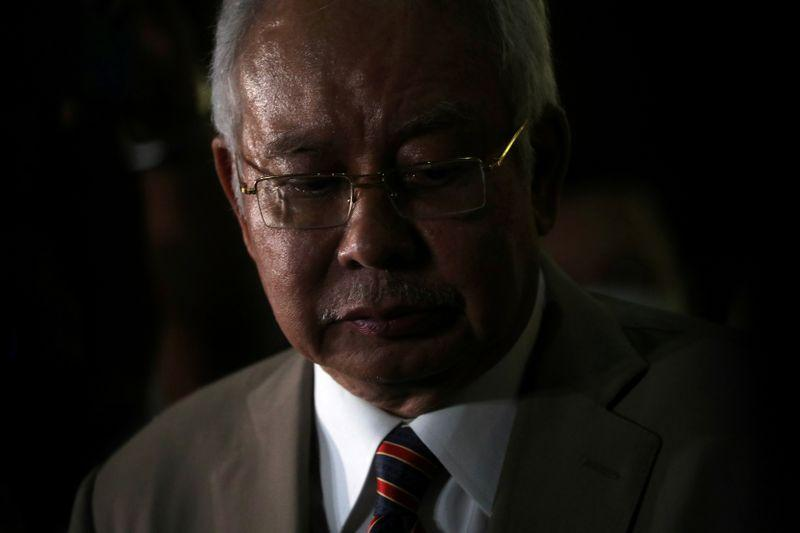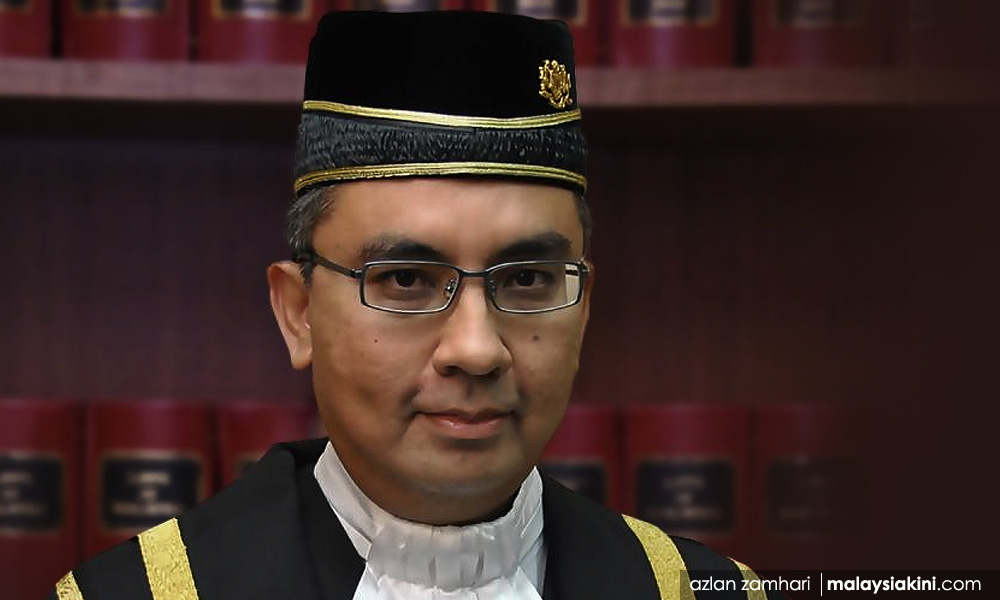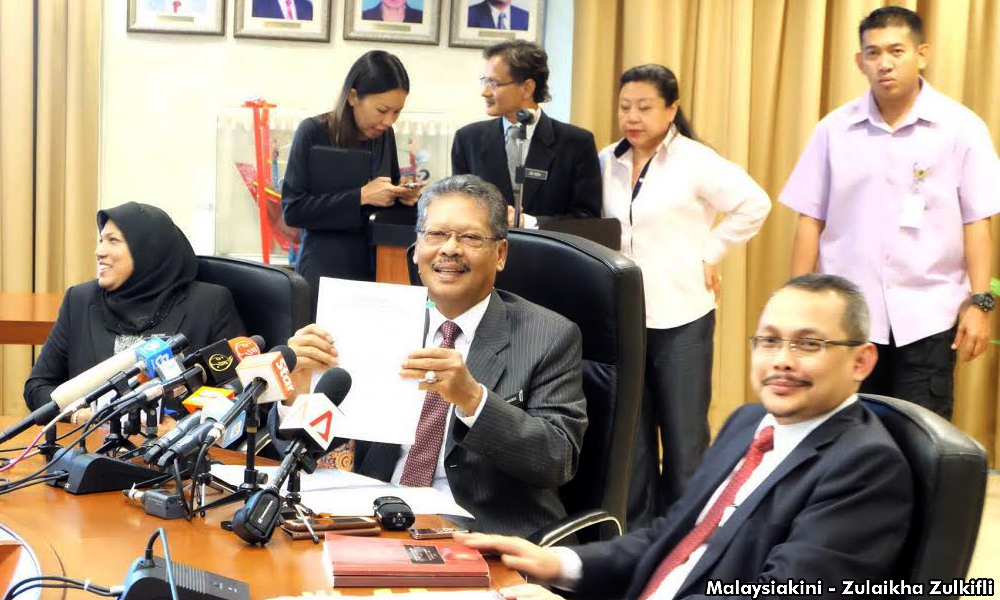5 Crucial Points Of Judge Nazlan's SRC Verdict Against Najib Simplified For You
The Kuala Lumpur High Court Judge, Mohd Nazlan Mohd Ghazali, also listed down 10 problems with the four so-called Arab letters, stating that they were "elaborate but with weak fabrication".
On Tuesday, 28 July, former prime minister Najib Razak became a convict after the Kuala Lumpur High Court found him guilty of the RM42 million corruption charges relating to the SRC International trial
Najib, who was facing seven charges of abuse of power, corruption, and money laundering involving RM42 million from SRC International, a former subsidiary of sovereign wealth fund 1MDB, was found guilty in all charges by Judge Mohd Nazlan Mohd Ghazali who took two hours to deliver his judgement.
Nazlan's verdict made Najib the first former Malaysian prime minister to be convicted in the courts.
While Najib has been sentenced to 12 years in jail and fined RM210 million for his crimes of corruption, the convicted criminal has yet to spend a night in prison as Judge Nazlan granted a stay of execution.
Following which, Najib filed an appeal against his conviction and sentence on Thursday, 30 July.
A convicted Najib during a news conference outside Kuala Lumpur High Court on 28 July.
Image via Lim Huey Teng/ReutersJudge Nazlan has since become a victim of rumours by Najib's supporters in an attempt to question his credibility by linking the 51-year-old to former prime minister Dr Mahathir Mohamad. They accused him of being either the grandson or grandnephew of Mahathir.
Several netizens alleged that Nazlan was the son of a man named Ghazali Ali, the brother of Dr Siti Hasmah, who is the wife of Dr Mahathir, who served as the 4th and 7th Prime Minister of Malaysia.
This included Pertubuhan Minda dan Sosial Prihatin Malaysia president Ramesh Rao who wrote, "The judge for the 'bossku' trial is actually a relative of Tun Mahathir. No wonder the judge is so arrogant and rude!"
A check by SAYS found that Dr Siti Hasmah does not, in fact, have any siblings named Ghazali Ali.
Ramesh Rao has since been fallen into Bukit Aman's radar, with its Criminal Investigation Department investigating him under the Sedition Act 1948 and the Communications and Multimedia Act 1998.
While Nazlan's entire written verdict has yet to be released, this SAYS writer got his hands on a 55-page-long extract of the judgment.
In it, we found several key issues raised by the no-nonsense judge and decided to simplify a few of them in this story for our readers.
1. What former attorney-general Mohamed Apandi Ali and former chief commissioner of the Malaysian Anti-Corruption Commission Dzulkifli Ahmad said back in 2016 doesn't matter. They had cleared Najib.
This is because both Apandi and Dzulkifli in their evidence had admitted in cross-examination about not being aware of further investigations undertaken by MACC after they cleared Najib in January 2016.
The former A-G, who was the 14th defence witness (DW14), had cleared Najib of the allegation based on the testimony of the former MACC chief, who was the 17th defence witness (DW17).
Subsequent to the NFA (no further action required) on the investigation paper (IP) by the former A-G, MACC recorded statements from 76 new witnesses and more statements from existing witnesses.
"To put it simply, the opinion of (Apandi) and (Dzulkifli) cannot replace the evidence before this court to arrive at this decision," Nazlan said, implying that in the court of law evidence matters, not opinions.
2. Despite the arguments that the setting up of SRC was for legitimate national interest, Najib has personal and private interests in SRC
According to Judge Nazlan, it is absolutely clear that the idea or proposal to set up SRC did not originate from some government agencies or ministry despite the matter being in the 10th Malaysia Plan.
"The impetus for the proposal to actually initiate what was embedded in the plan came from someone associated with 1MDB and not the government," he said in the judgement.
"It has been earlier established by evidence that the accused has personal and private interests in SRC, a finding that remains unrebutted by the defence," he added while offering a further explanation about why it doesn't matter whether or not Najib was singularly responsible for the setting up of SRC.
"The more pertinent point is that the approval for the establishment of SRC by the accused (Najib) provided the true starting point for the involvement of the accused in the company."
3. While Najib swore on Allah on Tuesday to claim that he has never demanded the money or been offered the RM42 million, what really matters is how that sum of money landed in his bank account
Judge Nazlan ruled that there is no requirement for the prosecution to prove whether the RM42 million that was found in Najib's private bank account was part of the RM4 billion financing loan from Retirement Fund Incorporated (KWAP) that was granted to SRC in two separate applications.
"There is no dispute from the evidence including the money trail that the RM42 million was taken out of the accounts of SRC as long as it can be shown that the accused intended to obtain the money that belongs to SRC. That's the result of the decision made by the accused and when there is a conflict of interest, then the offence in this context is complete," he said, according to the transcript of the judgement.
"There is no necessity to prove that the exact monies that went into the private bank account of the accused be part of the RM4 billion financing loan. The proof required is that the fund in question was the property of SRC, how the funds came about to be part of the property of SRC is irrelevant."
According to the judgement, a very telling evidence that further supports the case of the prosecution is the contrasting course of conduct taken by Najib before and after the RM4 billion loan from KWAP was disbursed to SRC and how the state-owned company under his ministry used it.
Najib showed no concern with how the money was used despite the fact that it came from the retirement pension fund and whether SRC fulfilled its stated goals of promoting national energy strategic initiatives.
He said that Najib's lack of action to recover the funds frozen by the Swiss Authorities for alleged money laundering is "therefore very puzzling and is instead much more consistent with the conduct of one who did not want the problem resolved given his own complicity" in the unlawful transfer of the funds.
4. The problems with Najib's testimony that the late Abdullah of Saudi Arabia wished to make financial donations to him for his work
This, despite the fact that Najib did not personally hear that the former Ruler of the Kingdom Saudi Arabia or the Saudi royal family wanted to provide financial support for his leadership.
"There was no evidence of the accused attempting to verify this intention attributed to King Abdullah with anyone. Not with the King directly, nor with any of the government officials who could have easily checked to verify the information for the Prime Minister," Judge Nazlan said.
According to the judgement, there was also "no evidence if the intended donation would be accompanied by any conditions of use, either. None whatsoever", with Najib taking the word a fugitive businessman.
"This was a donation from one independent county to another. Would this be a form of foreign aid in terms of the grant, if not a loan, or was it intended to be donated on a personal basis? Which would raise a host of other questions including that of national security," the judge said.
Nazlan pointed out that while Najib could have easily instructed any of his dozens of government officials who accompanied him at the audience with the late King Abdullah in Riyadh to verify the details, he as a prime minister simply chose to be content with the simple notification by Jho Low.
"As such, regardless of Jho Low's influence within segments of the Arab royalty, and the accused's own confidence in him based on what he had accomplished, I find that the failure of the accused to ensure official confirmation of the intended donations from King Abdullah shows that his belief that the donations would be gifted by King Abdullah to have been most improbable," said the judge.
"In other words," Judge Nazlan said, Najib "held no such belief".
All roads lead to Rome, in this case, though, they lead to Riyadh or so it seems.
5. The 10 problems with the four Arab letters
According to Judge Nazlan, the issue is not whether the so-called Arab letters and their content are genuine but it is whether Najib was justified in having relied on them for his belief that the foreign remittances that arrived in rows in his personal accounts came from the late King Abdullah.
"There are many problems with these letters," he said, adding that he will "list only ten such problems".
1. The first letter was dated 1 February 2011, despite the fact that Najib claimed Jho Low told him about the donation in the middle of 2010. Additionally, it carried the sign of not King Abdullah but of one Prince Saud, which ought to have immediately alerted Najib to make inquiries to confirm.
2. Najib testified that he did not Prince Saud and if Prince Saud is in any way related to King Abdullah. This further made the need for verification all the more important but he failed to do so.
3. The stupendously large amount of money disclosed in the first letter which incredibly did not trigger Najib to make any inquiries to satisfy himself as to the legality of the source nor was he alarmed when the amount became staggeringly higher in the second and the third letter.
4. The letters take great pain to emphasise that the gifts should not be construed as corruption. Yet, Najib, an intelligent person, and the Prime Minister at the time did not consult authorities on the matter in spite of the fact that gratification is defined in Section 3 of the MACC Act 2009 to include money, donation, gift, etc.
5. While Najib claimed that the funds came from the King, he did not acknowledge the alleged donations or even thanked the Saudi Monarch for the same despite having actually written two letters to the King.
6. In 2012, Najib actually returned a large amount on the pretext that this was the surplus and in order to avoid political issues with him holding a large amount of money. This raises many other issues.
7. What's especially significant is that despite returning the amount, Najib had no qualms accepting further remittances in 2014. This was neither solicited nor explained.
8. Najib's apparent lack of suspicion despite knowing the amount to expect as stated in the letters, when the fund which he actually received was significantly less than promised in the fourth letter.
9. While all four letters stated that it was for Najib to decide how to utilise the funds at his discretion, the considerable part of this spending was channelled to political organisations and parties under Barisan Nasional that ruled at the time. As such, it cannot be said that Najib did not benefit politically.
10. Money trails confirmed that funds from these remittances were used to settle credit card bills for personal purchases and expenses made in Hawaii and Italy despite Najib claiming that the purposes of remittances were to help him continue leadership of Malaysia and promote the development of Islam.
"Given such evidence and circumstances, it must mean that the defence that the accused believed the remittances originated from the late Saudi King was at best elaborate but with weak fabrication."
In other words, what Judge Nazlan said about Najib's defence that he honestly believed that the funds remitted into his accounts were donations from King Abdullah "was nothing but an implausible concoction".


